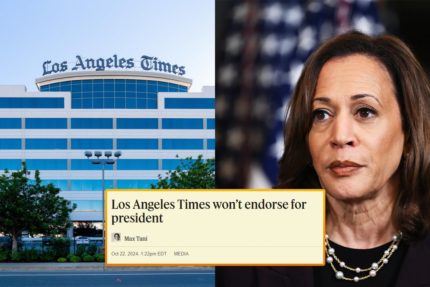The Los Angeles Times recently made headlines by refraining from endorsing Vice President Kamala Harris for the upcoming presidential race. According to sources, Nika Soon-Shiong, daughter of LA Times owner Patrick Soon-Shiong, allegedly influenced the paper’s decision as a protest against Harris’s support for Israel’s military actions in Gaza. Nika, a prominent political activist known for her far-left stance, openly opposes what she describes as a “genocide” and has shared her views on social media, declaring the decision to withhold endorsement as a principled stand.
Though Nika Soon-Shiong does not hold an official role within the newspaper, her activism has previously stirred conversations about her influence on the publication’s editorial stances. She stated on X (formerly Twitter), “For me, genocide is the line in the sand,” while distancing her move from support for Donald Trump. A community note, however, contested her claim, indicating that the LA Times Editorial Board had indeed voted to endorse Harris but was overruled by Dr. Soon-Shiong. The statement added fuel to the controversy, raising questions over media independence and personal influence in journalistic decisions.
Resignations and Internal Dissent Follow Non-Endorsement Decision
The decision not to endorse Harris has reportedly led to internal conflicts, culminating in the resignation of several prominent members of the LA Times editorial team. Mariel Garza, the editorial editor, stepped down in protest, stating that silence in the face of a crucial election was not an option. “In dangerous times, honest people need to stand up,” she wrote in her resignation letter. Her sentiment was echoed by editorial board members Robert Greene and Karin Klein, both of whom announced their departures in protest of the decision.
Greene, a Pulitzer Prize-winning journalist, voiced his disappointment, saying, “It hurt particularly because one of the candidates, Donald Trump, has demonstrated such hostility to principles that are central to journalism.” Greene’s concerns reflect a broader disquiet among the editorial staff, who had reportedly planned a series of editorials to endorse Harris. Veteran writer Tony Barboza noted in an internal message that the entire series had been scrapped, leaving staff members disheartened by the perceived mischaracterization of their work.
Patrick Soon-Shiong Responds: Defends LA Times Objectivity Over Personal Bias
In response to the backlash, Dr. Patrick Soon-Shiong issued a formal statement explaining his decision as part of a family consensus, aiming to present an objective perspective for LA Times readers. Dr. Soon-Shiong, who has previously shared his experiences with apartheid in South Africa, insisted that the decision was not influenced by any single issue. He emphasized his intent to let readers form their own opinions rather than push the publication’s endorsement of a candidate.
Dr. Soon-Shiong clarified that his daughter’s stance represented her personal views and did not reflect the paper’s editorial policy. He also cited the need for “sifting fact from fiction” as a primary responsibility, underscoring his commitment to maintaining journalistic integrity. His measured response contrasts with his daughter’s more outspoken position, reinforcing the notion that editorial decisions should be guided by collective judgment rather than individual beliefs.
Parallel Non-Endorsement at The Washington Post Draws Comparisons
The LA Times decision follows a similar controversy at the Washington Post, owned by Amazon founder Jeff Bezos. The Post also refrained from endorsing a candidate, sparking a wave of criticism from former executives and staff members. According to an internal report, Bezos’s choice mirrored a return to a non-endorsement tradition in place years prior, a stance that current publisher Will Lewis defended as consistent with the Post’s values. In a public statement, Lewis suggested that the choice respected readers’ independence, noting that it would likely provoke diverse interpretations.
Lewis framed the decision as an effort to prioritize readers’ trust in democratic principles, rather than sway opinions. Like the LA Times, the Washington Post faced internal dissent, with many opinion staff expressing frustration at the move. Both publications’ decisions mark a significant shift, given their historical support for Democratic candidates in previous elections. This parallel between two major American newspapers has sparked a broader discussion about the role of endorsements and the influence of ownership on editorial independence, especially amid increasingly polarized political landscapes.














